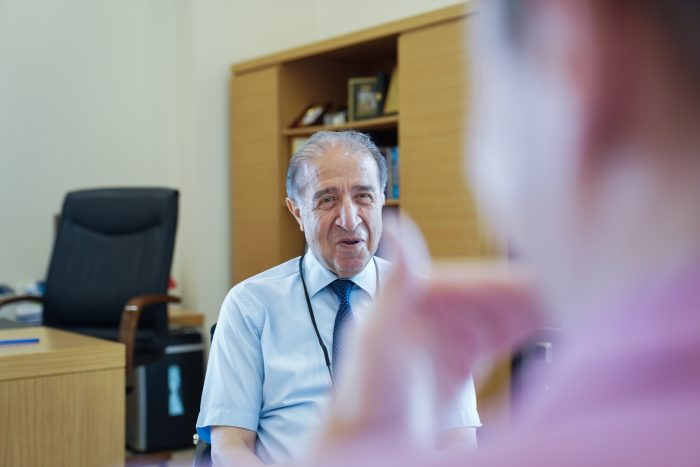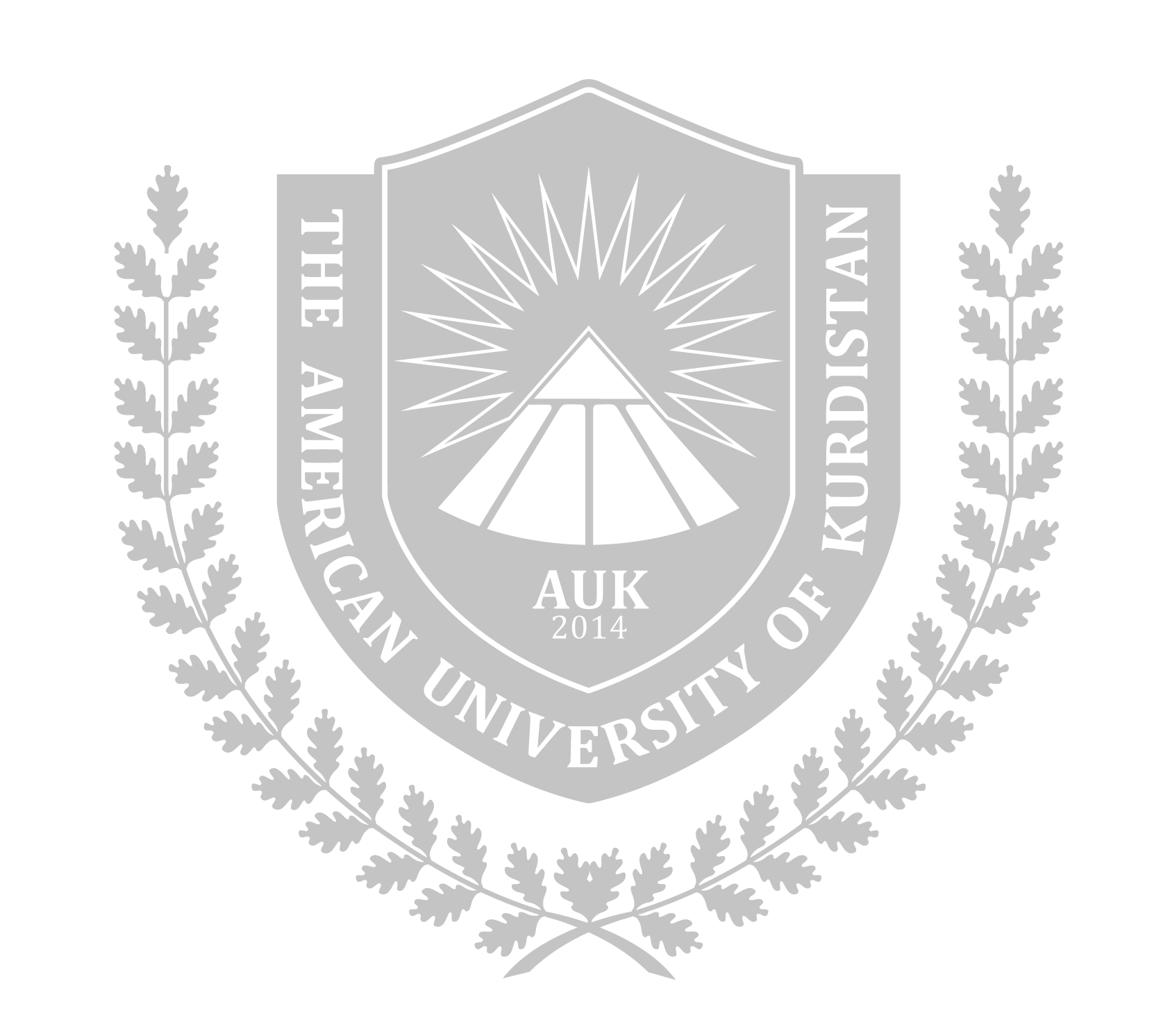Interview with Outgoing AUK Provost Dr. Nazar Numan
Dr. Nazar Numan will be retiring from his post as Provost of the American University of Kurdistan (AUK) at the conclusion of the 2022-2023 academic year. At its May meeting, the AUK Board of Trustees awarded him the title of Provost Emeritus for his years of service to the institution. Dr. Numan will always remain a part of the AUK community.
Before the AUK Provost could ride off into the sunset, Content Writer Michael Collins did an interview with him. Here is what Dr. Numan had to say about all he has already done and what is next.
You have been a career academic, but you have also done consulting for oil companies. Where else have you been over your long professional career?
Dr. Nazar Numan: “My academic career as faculty member has been fifty years long. I started off as a teaching assistant during my Ph.D. study at the University of Sheffield, England, and I taught for one year in England after earning my Ph.D. I joined the Department of Geology at the University of Mosul, where I taught courses to undergraduates and graduate students while supervising Master’s and Ph.D. students’ research. I co-founded the Center for Remote Sensing, where I designed the courses for the Master’s program, and chaired the Remote Sensing Department. I was actively involved in graduate studies with academic departments in the universities of Baghdad, Basra, Salahuddin, and Sulaimaniyah. In addition, from the 1970s to the 1990s, I was collaborating with the Iraq Oil Exploration Company in Baghdad and the Northern Oil Company in Kirkuk. I consulted for Total Oil of France in the exploration of the East Baghdad Oil Field, and I also consulted for Genel Energy in the structural geological investigation for the Beri Bahar exploratory oil well near Zawita, Kurdistan.
I moved to the University of Duhok (UoD) in 2006. I established and have been operating the Duhok Seismic Station (which is part of the global network of seismic stations) in collaboration with the University of Arkansas at Little Rock (a recipient of a digital seismometer by the U.S. Department of Energy). In the UoD, I designed the graduate program in Spatial Planning, for which I became Department Chair. Later, I was appointed as Dean of the College of Engineering at UoD for four years, also serving as Dean of the College of Spatial Planning and Applied Science for four years. Moreover, I served for four years on the quality assurance committee and for three on the Human Capacity Development Program (HCDP) committee for graduate scholarships at the Ministry of Higher Education and Scientific Research in Erbil.
Internationally, I co-supervised Ph.D. students at the University of Paris-Marie Curie, the University of Dortmund in Germany, the University of Arkansas at Little Rock, and New York University. I took part in the UNESCO-administered, two-year project of introducing Accreditation Board for Engineering and Technology (ABET) standards to ten colleges of engineering in Kurdistan and Iraq. I have, furthermore, been an invited speaker at the University of Sheffield (1981), the University of Paris (1991), Total Oil, Paris Headquarters (1991), the University of Arkansas at Little Rock (2007 and 2009), and Princeton University (2007).
I first joined the American University of Kurdistan on a part-time consulting contract from March to August of 2017, and I was appointed the Provost of AUK in September 2017.”
You have spent plenty of time in the classroom and plenty of time as an administrator. What is the one quality you feel it is most important for a person to have to be successful in both spheres?
Dr. Nazar Numan: “I would imagine effective communication is of crucial importance whether we are teaching or dealing with administration. In the classroom, effective communication helps teachers engage students by presenting complex information in a way that is clear and understandable. Effective communication involves listening actively and adapting communication styles to students of different levels of performance, in a way that helps them understand concepts better and perform well academically. Thus, by establishing open lines of communication, teachers can create a supportive and inclusive learning environment.
As for administration, effective communication helps in forging collaborative relationships with colleagues, department chairs, deans, and other stakeholders. Clear and effective communication helps in conflict resolution, enabling a person to navigate conflicts with diplomacy and empathy, and promotes a positive working environment.”
As Provost of the American University of Kurdistan, you brokered relationships with over universities. Could you give an example of this of which you are particularly proud?
Dr. Nazar Numan: “The relationships that AUK has developed with local universities have been crucial for us. In the early years, we did not have any labs of our own, so we had to use the labs in the University of Duhok for our General Education courses in chemistry, physics, and biology, and we also had to use the microbiology lab for our nursing students. What is more, our students were then (as they are still are) residing free of charge in the female and male dorms at the University of Duhok. Additionally, most of our adjunct faculty are employees of the universities of Duhok, Duhok Polythetic, and Zakho. I would say that personal contacts with people in those universities are instrumental in strengthening institutional ties. We are developing contacts with the University of Mosul and Nineveh University, and we will explore areas of common interest with these major universities that are in close geographic proximity to AUK.”
The University continues to progress. What is one way in which the University has progressed over the course of your six years?
Dr. Nazar Numan: “Getting the three United States Department of State Grants [two of them titled ‘Supporting American-Style Higher Education in Iraq,’ the other titled ‘Support to American-Style Higher Education in Iraq’] has been crucial in consolidating our student recruitment through scholarships. Since these scholarships were awarded on a competitive basis, we got high-quality students, very well prepared for study at AUK. The grants also went toward developing our labs, namely the Nursing Skills & Simulation Lab, the BIM Lab, and the FAB Lab. They also financed equipping a few of our classrooms with CISCO’s synchronous virtual classroom system. In addition, the grants supported our accreditation efforts by linking us to universities in the U.S., such as James Madison University, Middle Tennessee State University, and the University of Florida. These relationships were – and continue to be – important in the development of our faculty, students, and administrative staff.”
What have you cherished most about your time at the American University of Kurdistan?
Dr. Nazar Numan: “I have enjoyed the cooperative working environment at AUK. The employees with whom I have worked particularly closely include the AUK President, the deans, department chairs, various faculty members, and the directors and administrators at the Admissions & Registration Department, the Office of Grants Management, the AUK Library, the Office of Institutional Effectiveness and Planning, Human Resources, and the IT Office. So many students also contribute to this ‘collaborative working environment.’ Educationally, I am a total admirer of the American system of higher education, emphasizing soft skills in addition to hard skills. Finally, I like the way quality assurance and continuous improvement are followed at AUK.”
In your retirement, what is a personal passion you look forward to pursuing?
Dr. Nazar Numan: “I will spend more time with my family. I have been a lifelong learner, and I want to follow up on my research concerning structural geology and the geology of Kurdistan in particular. I will also pursue my interests in philosophy and history.”
As AUK’s Provost Emeritus, what are some things you will do to keep in touch with the AUK community?
Dr. Nazar Numan: “I have forged many friendships at AUK and will remain in contact with all of my friends. I will follow the news of AUK and will offer to give lectures and seminars for the students, faculty, and administrative staff. I would like to attend AUK activities whenever I am physically present in Duhok.”


